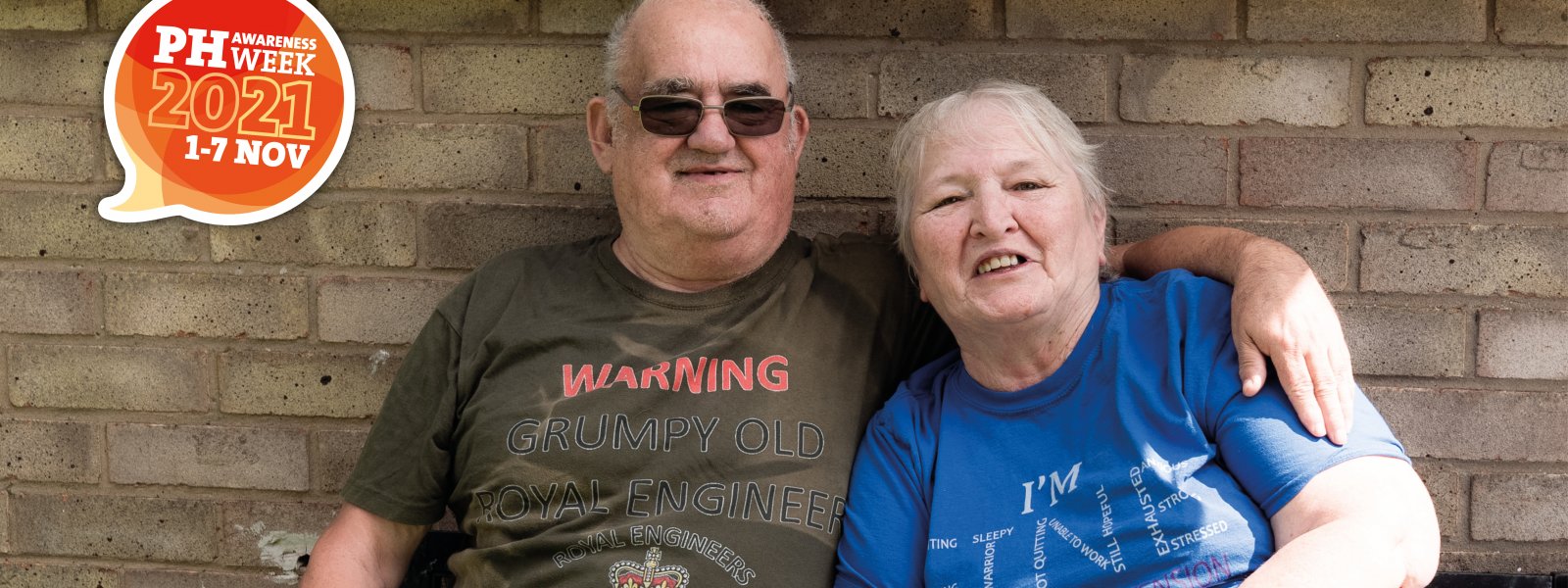“It’s difficult, but the treatment is helping”
Pam Fenton was diagnosed with idiopathic pulmonary arterial hypertension in 2018, and her husband Graham gave up his job to help care for her.
The great-grandparents, who live in East Yorkshire, are sharing their story to help raise awareness of the condition and encourage more understanding and earlier diagnosis.
Pam is 65 and lives with a Hickman line delivering medication to her heart. She is on oxygen therapy for 16 hours a day and also takes multiple tablets and inhalers.
“I had never been ill in my life until 2013. I couldn’t walk up the stairs, I was blacking out, and I put on four stone of water weight. I used to cry; a newborn baby can breathe, so why couldn’t I?
I didn’t get my diagnosis for five years, and in some ways, it was a relief to know there was a reason for it all.
I was broken during those years before diagnosis. They were the worst years of my life. I couldn’t go out, so people stopped inviting us, and they didn’t believe I was as poorly as I said I was. People don’t understand how nasty and horrible they’re being.
Before I was diagnosed, doctors were telling me I had asthma or angina. Eventually, after I started leaking water from my legs, I was blue-lighted to hospital, where I blacked out. I was referred to the specialist centre in Sheffield where I was told I had PH and started on the Hickman line shortly afterwards.
Now, I have good days and bad days. But the medication has made a big difference and thinking about ‘before’ and ‘after’ helps me realise that.
In December 2017, five months before I was diagnosed, Graham and I took two of our great-grandchildren to a Santa’s grotto and when we got there, I couldn’t walk far enough to watch them with him. I was heartbroken.
A year later, after I’d started on medication, we went back and I was able to watch them with Father Christmas, plus a reindeer and a donkey. I had to take my oxygen with me, and it took me about three days to recover, but I did it.
There’s still a lot I can’t do, but I try.
It’s hard to explain how much the breathlessness affects me. Sometimes I can’t get a sentence out and sometimes I can’t get out of bed.
It’s very difficult to walk from one room to another without having to rest. It’s a horrible disease.
I am worried for the future as I want to be here for as long as I can be. Sometimes the more I know about this disease the more it frightens me, and other times the more I know, the less it frightens me.
Having PH makes me feel physically and mentally tired, but also grateful to be alive. I am determined that I am going to do as I’m told [by my medical team] and do the best I can.”
Graham has been married to Pam for 25 years. He gave up his job to support her when her symptoms worsened in 2015.
“PH has turned our lives upside down. In some ways we’re closer, yet sometimes we can be distant as well. We’d been so active together, and suddenly it was like hitting a brick wall. It was like starting a new relationship, and we had to become more honest with each other.
I didn’t understand the disease at first and I was looking at her and thinking ‘how am I going to cope with this?’
I had a very good job with a good bunch of people but as time went on, I began to realise that I was going to have to give up work to look after Pam.
There was a sudden shock of being unemployed and not getting up at six in the morning to go to work, and then trying to establish a routine that suited Pam. The first few days we did nothing but sleep. I was a bit lost.
I was left in the dark a lot [by our local hospital] but once we got referred to the specialist centre, I was included in the conversations and some of the lights started to come on.
I help with the medication side of things, but it can be very daunting if you don’t know what you’re doing. I do the pump [for the Hickman line] every so often, and I sometimes wonder if I’m doing it correctly. My confidence can take a beating if I do it wrong, but I know that our specialist centre is always there to help.
Now I can just look at Pam and see that she needs a rest or a drink. I do the shopping – even though I dislike it – and sometimes you feel like you’re just fetching and carrying. It’s the realisation that I’m now a carer… what a word.
It can make me feel tired, sometimes even lonely, as I’m doing things I wouldn’t have been doing if I’d been at work. It’s difficult to carry on with it and understand I have to do it for my wife’s health and not for myself.
Pam’s gone from being a bubbly person who would play around with her grandchildren to suddenly not being able to walk properly or do things such as picking the grandchildren up.
It hurts her, and it’s difficult to admit that things are a lot harder.
She was getting her confidence back and then covid came along and that took the wind out of her again. But now that things are improving, we are getting out a bit more.
We can’t go far because of the oxygen, and it is so tiring for Pam that we have to justify what we do because of the impact on her. It’s difficult, but the treatment is helping.”
















